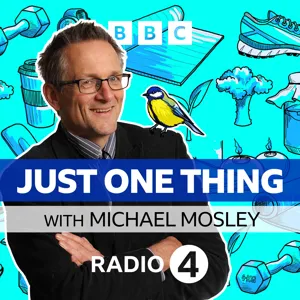Podcast Summary
Swap refined grains for whole grains for better health: Making small dietary changes like swapping refined grains for whole grains can lower blood pressure, improve blood sugar levels, reduce cholesterol, and contribute to a longer lifespan. Whole grains offer more fiber, essential minerals, and antioxidants than refined grains.
Making small but impactful changes to your diet, such as swapping refined grains for whole grains, can significantly improve your overall health. This simple switch can help lower blood pressure, improve blood sugar levels, reduce cholesterol, and even contribute to a longer lifespan. Whole grains, found in foods like brown rice, whole wheat pasta, and rolled oats, contain more fiber and essential minerals and antioxidants than refined grains. Additionally, the convenience of shopping for a custom-designed ring online at Blue Nile can make the process of proposing less stressful. And for those looking to begin their weight loss journey, PlushCare offers online access to certified physicians who can prescribe FDA-approved medications and provide guidance. In the episode of "Just One Thing," Doctor Michael Mosley emphasizes the importance of making small, achievable changes to improve health, like swapping white rice for brown rice. Whole grains can make a significant difference to one's health, and for most people, there's no need to severely restrict them. So, whether it's through making a simple dietary change or taking the first steps towards weight loss, remember that small actions can lead to big improvements.
Swapping refined grains for whole grains: Swapping refined grains with whole grains can lead to weight loss, reduced inflammation, and lower risk of chronic diseases due to whole grains' nutrients like fibers, antioxidants, and polyphenols
Making small swaps in your diet, specifically replacing refined grains with whole grains, can lead to significant health benefits. Whole grains, which include the germ and bran, are packed with healthy fibers, antioxidants, polyphenols, and other nutrients that are often removed during the refining process. These nutrients can help with weight loss by making you feel fuller longer, reducing inflammation, and potentially preventing chronic diseases like type 2 diabetes. A simple way to incorporate more whole grains into your diet is by swapping out refined grains like white bread, pasta, and rice for whole grains like rolled oats, whole meal bread, and whole meal pasta. Additionally, opt for whole grain snacks like whole meal crackers instead of processed options like crisps, chocolate, or sweets. This small change can lead to a healthier waistline, reduced inflammation, and a lower risk of developing chronic diseases.
Improve heart health by eating 50g of whole grains daily: Eating 50g of whole grains daily can lower heart disease-related deaths by 18% and promote heart health by providing essential nutrients and fiber.
Incorporating fifty grams of whole grains into your daily diet, which is equivalent to a bowl of porridge and a slice of rye bread, can significantly improve heart health. This simple dietary change can lead to a reduced risk of heart disease-related deaths by approximately 18%. Whole grains are beneficial due to their high fiber content and various nutrients that are removed during the refining process when we get refined grains. Fiber in whole grains can make you feel fuller for longer periods and eventually reach the gut microbiota, where it can have additional health benefits. A study by nutrition epidemiologist Dr. Kelly Sawicki at Harvard Medical School found that people who consume more whole grains experience less increase in blood pressure, blood sugar, and waist circumference compared to those who consume less or no whole grains. Overall, swapping refined grains for whole grains is an effective way to promote heart health without giving up carbs entirely.
Whole grains help control blood sugar with fiber and slower digestion: Eating 3 servings of whole grains daily can improve blood sugar control, increase fullness, and potentially aid in weight loss. Look for whole grain wheat or whole wheat flour as the first ingredient when shopping.
Whole grains help control blood sugar levels due to their fiber content and slower digestion. This leads to a more gradual absorption of glucose and sugar, resulting in lower increases in blood sugar. It's recommended to aim for about 3 servings per day of whole grains, which can be easily incorporated by switching out refined grains for whole grain versions in meals. Look for whole grain wheat or whole wheat flour as the first ingredient when shopping for whole grain products. Whole oats, quinoa, and popcorn are also excellent whole grain options. A serving size is typically a slice of bread or half a cup of cooked grains. Eating whole grains regularly can lead to increased fullness, improved mood, and potentially even weight loss.
Simple diet and lifestyle changes for better health: Incorporating whole grains into your diet, like making popcorn at home, can lead to reduced stress, better sleep, and improved heart health. Embrace resilience, consider getting an early night, and focus on high-quality, affordable goods for meaningful improvements in overall wellbeing.
Making simple changes to your diet and lifestyle can have significant positive impacts on your health and overall wellbeing. The speaker shares how incorporating whole grains into his diet, specifically through making popcorn at home, has led to reduced stress, better sleep, and improved heart health. He encourages others to give it a try. Additionally, the importance of resilience in the face of change was emphasized, as well as the potential benefits of getting an early night. The discussion also touched on the importance of finding high-quality, affordable goods, as demonstrated by the example of Quince. Overall, the message is that small, intentional choices can lead to meaningful improvements in various aspects of life.




![Blood Sugar Imbalance & Insulin Resistance: Your Guide to Stabilization [Wellness Radio Replay]](https://www.podcastworld.io/podcast-images/the-wellness-radio-with-drs-warren-3nnzlt0b.webp)
